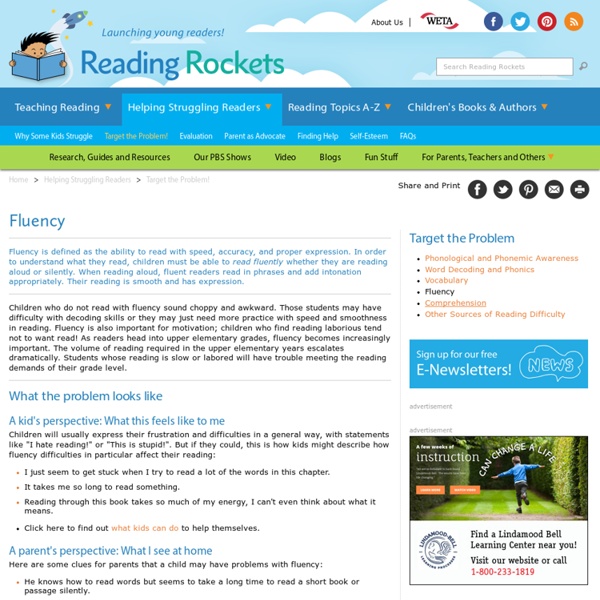Fluency

Improving Fluency in Young Readers -- Fluency Instruction
What is fluency? According the National Reading Panel (2000), fluency is the ability to read text with speed, accuracy and proper expression. Fluent readers: Recognize words automatically Read aloud effortlessly and with expression Do not have to concentrate on decoding Can focus on comprehension Why is fluency important? “Fluency is important because it provides a bridge between word recognition and comprehension.” Fluency doesn’t ensure comprehension, but comprehension is difficult without fluency. When students make gains in reading fluency, they are able to put their energies into comprehension and are able to analyze, interpret, draw conclusions, and infer meaning from texts. The 3 Components of Fluency Accuracy: Also known as automaticity, it refers to the person's ability to read words in a text. In order to implement fluency teaching into reading instruction, teachers need to be aware of the three components of fluency. Fluency Instruction Model fluent reading.
Fluency Practice Passages
Why Use Fluency Practice Passages Fluency is a key foundational skill that helps students read complex text with greater understanding. When students read with accuracy and expression at an appropriate reading rate, their fluency supports their comprehension. Repeated reading practice with short passages improves word recognition and automaticity. How to Use Fluency Practice Passages Passages are provided from Levels F to Z. Timed Reading Procedures You will need: Two copies of the assessment passage—one for the student and one for the instructor Stopwatch or clock Pencil Clipboard (so students will not see what you are writing) Administer a one-minute reading, starting the stopwatch when the student begins the first word of the passage (student will not read titles). During the reading, resist the urge to correct mistakes. Follow along on your copy word by word with your pencil. Timed Reading Scoring Example:
20 iPad Apps To Teach Elementary Reading
As anyone with a toddler knows, iPads are addictive for children. They seem to have some sort of special radar that lets them know when an iDevice is within their reach, and they’ll do anything they can to get their hands on them. Resistance is futile, but instead of lamenting excessive screen time, you can make your child’s iPad addiction a productive one with educational apps, including those that promote early reading. With these 20 apps, children can learn how to write letters, improve phonics fluency, and even write their own books. Read on to find the very best iPad apps for developing young readers, and feel free to share your own favorites in the comments. ABC PocketPhonicsKids can develop skills in letter sounds, writing, and first words with ABC PocketPhonics.
Related:
Related:




Yet another Reading Rockets page--I love this site!--this one for helping struggling readers. by mcussen Feb 16
This website helps for all of reading but I picked it for fluency. It shows activities to do before, during and after activity and it also gives you assessment data. by trrockford Nov 5
Reading rockets website contains information and exercises for increasing reading fluency. by bmahieu Sep 17